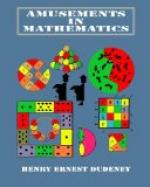“He is no relation to me whatever.”
The three men sighed and looked anxiously at one another. Mr. Stubbs got up from his chair to reach the matches, Mr. Packhurst proceeded to wind up his watch, and Mr. Waterson took up the poker to attend to the fire. It was an awkward moment, for at the season of goodwill nobody wished to tell Mr. Wilson exactly what was in his mind.
“It’s curious,” said Mr. Wilson, very deliberately, “and it’s rather sad, how thick-headed some people are. You don’t seem to grip the facts. It never seems to have occurred to either of you that my uncle and my nephew are one and the same man.”
“What!” exclaimed all three together.
“Yes; David George Linklater is my uncle, and he is also my nephew. Consequently, I am both his uncle and nephew. Queer, isn’t it? I’ll explain how it comes about.”
Mr. Wilson put the case so very simply that the three men saw how it might happen without any marriage within the prohibited degrees. Perhaps the reader can work it out for himself.
CLOCK PUZZLES.
“Look at the clock!”
Ingoldsby Legends.
In considering a few puzzles concerning clocks and watches, and the times recorded by their hands under given conditions, it is well that a particular convention should always be kept in mind. It is frequently the case that a solution requires the assumption that the hands can actually record a time involving a minute fraction of a second. Such a time, of course, cannot be really indicated. Is the puzzle, therefore, impossible of solution? The conclusion deduced from a logical syllogism depends for its truth on the two premises assumed, and it is the same in mathematics. Certain things are antecedently assumed, and the answer depends entirely on the truth of those assumptions.
“If two horses,” says Lagrange, “can pull a load of a certain weight, it is natural to suppose that four horses could pull a load of double that weight, six horses a load of three times that weight. Yet, strictly speaking, such is not the case. For the inference is based on the assumption that the four horses pull alike in amount and direction, which in practice can scarcely ever be the case. It so happens that we are frequently led in our reckonings to results which diverge widely from reality. But the fault is not the fault of mathematics; for mathematics always gives back to us exactly what we have put into it. The ratio was constant according to that supposition. The result is founded upon that supposition. If the supposition is false the result is necessarily false.”
If one man can reap a field in six days, we say two men will reap it in three days, and three men will do the work in two days. We here assume, as in the case of Lagrange’s horses, that all the men are exactly equally capable of work. But we assume even more than this. For when three men get together they may waste time in gossip or play; or, on the other hand, a spirit of rivalry may spur them on to greater diligence. We may assume any conditions we like in a problem, provided they be clearly expressed and understood, and the answer will be in accordance with those conditions.




